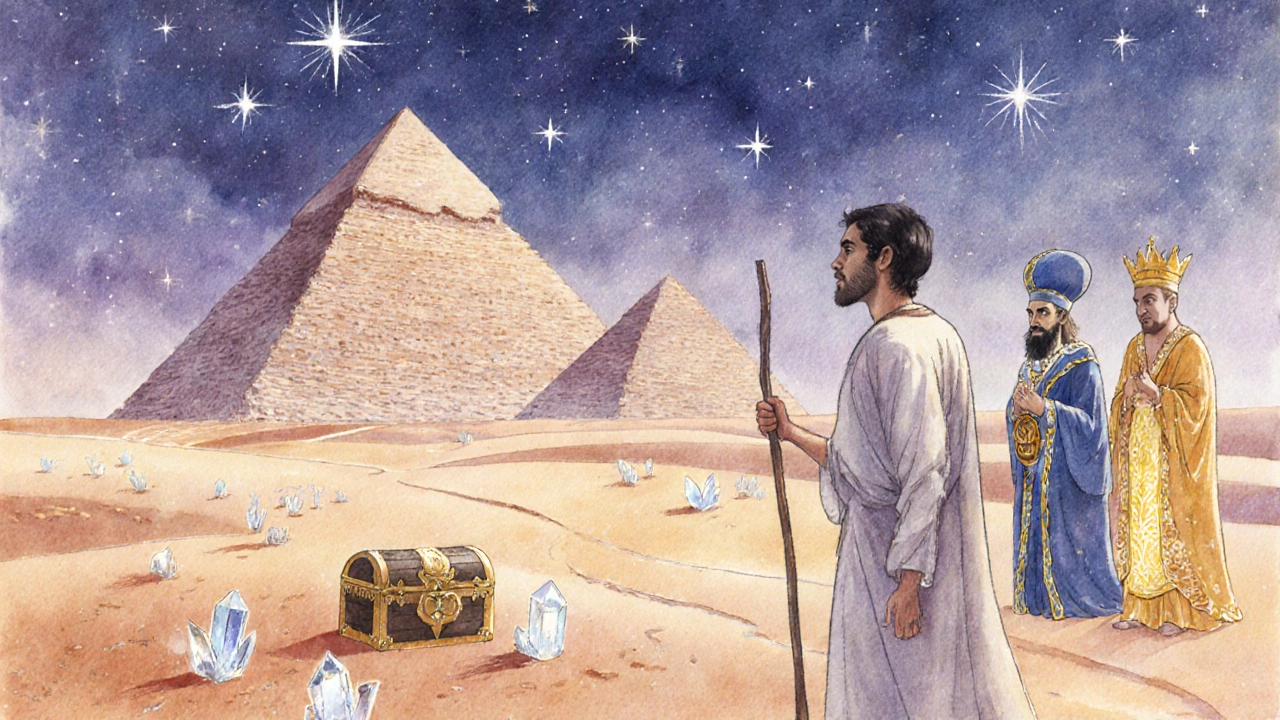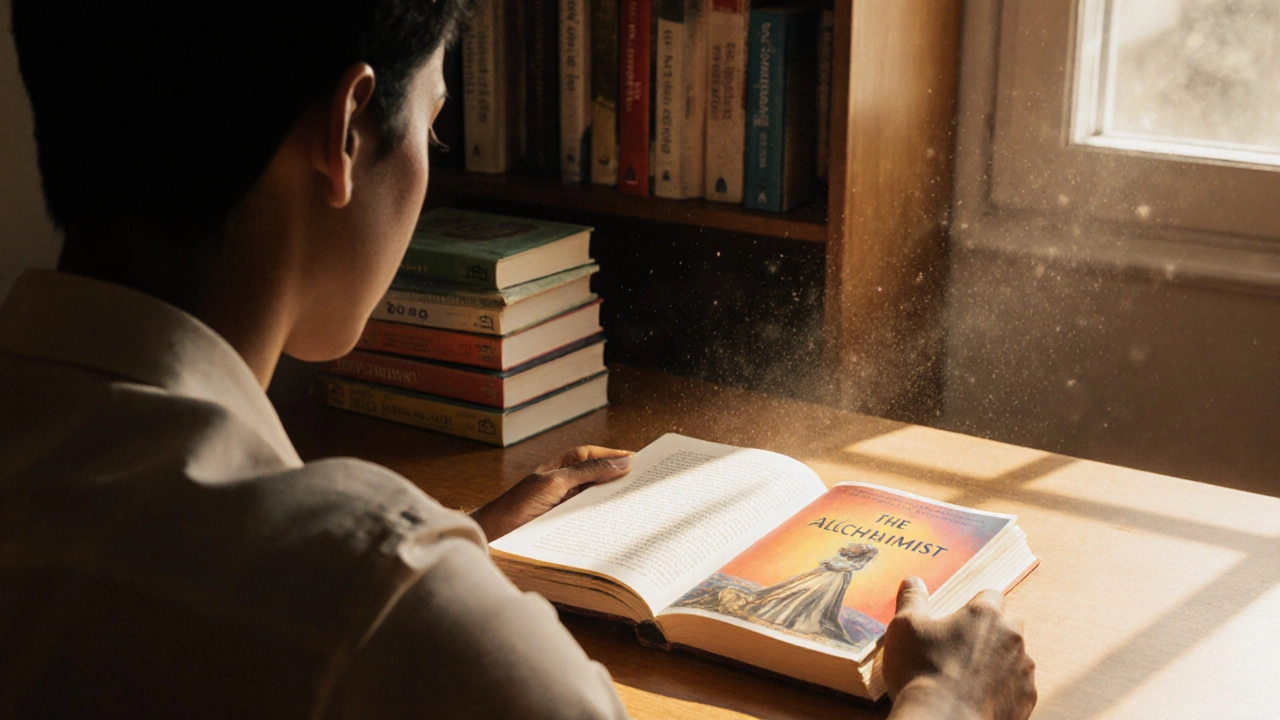Personal Legend Builder
Discover Your Personal Legend
Based on The Alchemist's wisdom, identify what you're most drawn to accomplish in life.
Your Personal Legend Action Plan
Your action plan will appear here after clicking the button above.
When you pick up a novel that promises to change the way you see the world, the first question that pops into most readers’ heads is: Is The Alchemist a self‑help book? The answer isn’t a simple yes or no, because the book lives at the crossroads of fiction, spirituality, and personal growth. Below we unpack what makes The Alchemist feel like a self‑help guide, where it draws the line, and who should read it if you’re after practical life advice.
What Exactly Is a Self‑Help Book?
A self‑help book, by definition, is a non‑fiction work that offers readers concrete strategies, mental models, or habits aimed at improving some aspect of life-career, relationships, health, or mindset. According to the self‑help book a genre focused on delivering actionable advice for personal development, the key ingredients are:
- Clear, step‑by‑step recommendations.
- Exercises or reflections that readers can apply immediately.
- A tone that feels like a coach speaking directly to you.
Meet the Author and the Story
The novel was written by Paulo Coelho a Brazilian novelist known for blending mysticism with everyday life and first published in 1988. It follows a young Andalusian shepherd named Santiago who dreams of finding a hidden treasure near the Egyptian pyramids. Guided by mysterious mentors-a king, an alchemist, and a crystal merchant-Santiago journeys across deserts, learns to read omens, and ultimately discovers that the real treasure lies within.
Why Readers Treat It Like a Self‑Help Book
Several elements give the novel a self‑help vibe:
- Universal Lessons: Each chapter ends with a concise moral-"When you want something, all the universe conspires to help you"-that reads like a mantra you might find on a vision board.
- Actionable Metaphors: The concept of a "Personal Legend" (your true purpose) serves as a framework readers can map onto their own career or relationship goals.
- Reflective Prompts: The narrative repeatedly asks Santiago (and thus the reader) to pause and listen to his heart, a practice similar to journaling exercises in many self‑help guides.
Where the Novel Breaks the Self‑Help Formula
Despite its motivational edge, the novel diverges from the typical self‑help structure in three major ways:
- Fictional Narrative: The story is told through characters, plot twists, and symbolic events rather than direct instruction. You don’t get a “Step1: Write down your goals.” Instead, you watch Santiago stumble, succeed, and learn.
- Open‑Ended Conclusions: The ending leaves room for interpretation-did Santiago find the literal treasure, or was the journey itself the reward? Self‑help books usually close with a clear action plan.
- Reliance on Mysticism: The novel leans heavily on omens, alchemy, and destiny. While many self‑help guides discuss intuition, they rarely prescribe mystical symbols as decision‑making tools.

Self‑Help or Literary Fiction? Mapping the Overlap
| Aspect | The Alchemist | Traditional Self‑Help |
|---|---|---|
| Genre | Allegorical novel | Non‑fiction guide |
| Structure | Story arc with characters | Chapters of tips and exercises |
| Voice | Third‑person narrator | Direct address (“you should…”) |
| Actionability | Metaphorical actions | Concrete step‑by‑step plans |
| Use of Myth | allegory a storytelling device that conveys abstract ideas through symbolic characters and hero's journey a narrative pattern identified by Joseph Campbell | Occasional anecdotes, rarely mythic structure |
Who Should Read The Alchemist If They Want Self‑Help Benefits?
Think of the book as a hybrid tool:
- Creative Thinkers: If you enjoy stories that spark imagination, the novel’s symbolic language can spark new insights about your own life purpose.
- Newcomers to Personal Development: Those who feel intimidated by dense how‑to manuals may find the narrative approach more inviting.
- Readers Seeking Spiritual Depth: The spiritual journey woven through the plot aligns with mindfulness practices without the jargon of modern self‑help trends.
If you prefer straight‑forward, checklist‑style guidance-like setting SMART goals or building a habit loop-you might pair the novel with a traditional self‑help title to balance inspiration with execution.
Practical Takeaways: Turning the Novel’s Wisdom into Action
Even if you decide the book isn’t a textbook for personal growth, you can still extract useful habits:
- Identify Your "Personal Legend": Write a one‑sentence statement of what you feel most drawn to accomplish. Keep it visible on your desk.
- Practice Listening to Omens: Treat small coincidences as signals. When an idea pops up repeatedly, explore it instead of dismissing it.
- Embrace Failure as a Teacher: Santiago’s setbacks-loss of money, betrayal-show that setbacks are part of the learning curve. Log each setback with a lesson learned.
- Adopt a Daily Reflection Ritual: Before bed, note one moment you felt “in sync” with your purpose, mirroring Santiago’s moments of clarity.
These steps turn the book’s poetic messages into concrete habits without rewriting the novel’s narrative.

Bottom Line: Is It a Self‑Help Book?
The short answer is: It’s not a self‑help book in the textbook sense, but it works as a self‑help catalyst. The story packs timeless lessons that can spark personal insight, yet it skips the explicit worksheets and action plans you’d find in a dedicated guide. If you enjoy learning through metaphor and are comfortable translating symbolism into real‑world steps, you’ll get the most out of it. Otherwise, pair it with a more prescriptive title for a balanced growth plan.
Next Steps for Curious Readers
Try this three‑part experiment:
- Read The Alchemist and jot down any line that feels like advice-you’ll likely gather 5‑7 “golden nuggets.”
- Choose a classic self‑help work-such as Atomic Habits or The Power of Now-and compare its recommendations with the nuggets you collected.
- Implement one overlapping habit for a week. Track the impact. If it works, you’ve turned fiction into a personal development tool.
Feel free to revisit the novel after a month; you’ll probably notice new layers you missed the first time around.
Frequently Asked Questions
Is "The Alchemist" meant to be read as a guide?
No, it is a novel that uses allegory to explore purpose. However, its themes are often applied like life‑coaching advice.
Can I use the book for a daily meditation practice?
Many readers pick a favorite passage-like the line about the universe conspiring-and repeat it as a mantra during meditation.
How does the novel compare to classic self‑help titles?
Unlike books that list step‑by‑step instructions, "The Alchemist" offers a story‑driven framework. It inspires, but you’ll need to translate the inspiration into concrete actions.
Should I read this before or after other self‑help books?
Either works, but many readers start with the novel to spark curiosity, then move to more practical guides for execution.
Does the book’s religious symbolism limit its usefulness?
The symbolism is largely universal-talking about destiny, intuition, and transformation-so it resonates across faiths and secular readers alike.

